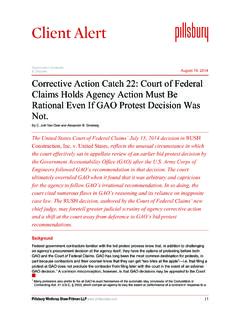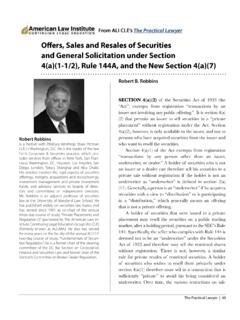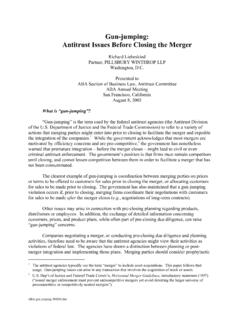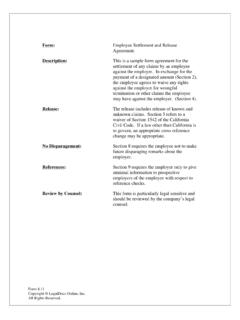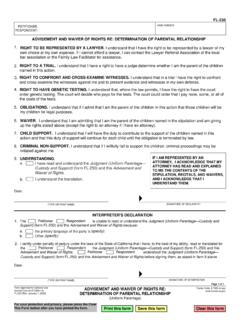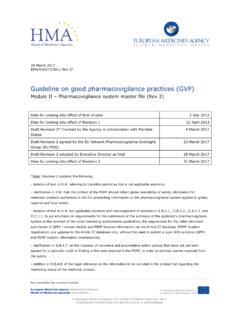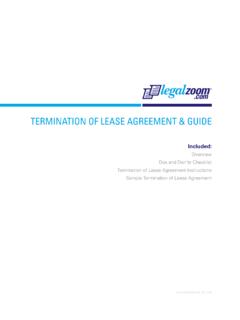Transcription of The False Promise of Injunction Clauses
1 Winthrop Shaw Pittman LLPThe False Promise of Injunction ClausesThis article first appeared in Managing Intellectual Property, May Frederick A. Brodie and Nathan R. ReadAlthough Injunction Clauses can be an important tool in contracts governing IP rights, they are often misunder-stood. Despite such a clause s Promise of injunctive relief in the case of a breach of the agreement, US courts are not compelled to grant automatic injunctions based solely on contract language. Thus, while an Injunction clause can provide some evidence of irreparable harm, estop the other party from challenging the applica-tion for an Injunction , and weigh in favour of relief when the balance of hardships is considered, parties to agreements containing such Clauses should be aware that injunctive relief remains in the judge s containing Injunction Clauses , in which the parties agree that a court must grant them an Injunction upon request.
2 Can often give parties a False sense of security regarding remedies for injunctive relief. In such Clauses , the contract-ing parties stipulate that a breach of the agreement would meet the factual requirements for an award of injunctive relief. After having laid a factual groundwork, the parties declare that an innocent party will be legally entitled to an Injunction in the event of a breach. But do contracting parties really have the authority to compel a court to grant one of them an Injunction upon request?
3 Courts have fre-quently answered that question no . Thus, while an Injunction clause is of some use, it cannot guarantee injunctive ticket to injunctive reliefCourts examining Injunction Clauses have made clear that these provi-sions cannot guarantee an automatic begin with, the contracting parties have no right to decide whether to grant injunctive relief. Rather, that decision lies within the court s have also recognised that the recitals in an Injunction clause may be inaccurate. At the time the contract is signed, the parties lack foreknowledge of the nature or consequences of a particular breach.
4 Even if the anticipated conse-quences occur, the parties might simply be wrong in characterising the harm as irreparable . For example, in First Health Group Corp v Nat l Prescription Adm rs, Inc (MD Pa 2001), when a medical benefits manager sought to enforce non-competition, non-solicitation and confidentiality agreements against its former employee, the presence of Frederick A. BrodieLitigation + R. SmithLitigation + A. Brodie is a litigation partner in the New York office of Pillsbury Winthrop Shaw Pittman LLP, and Nathan Smith is a litigation associate in the firm s San Diego Winthrop Shaw Pittman LLPL itigationan Injunction clause did not avoid the required analysis of whether the company would suffer irreparable harm without a preliminary injunc-tion.
5 The court denied injunctive relief because the threatened harm was both speculative and compens-able by monetary , courts have rejected the notion that a contract clause, by itself, provides sufficient evidence to support preliminary injunctive relief. For instance, in Dominion Video Satellite, Inc v Echostar Satellite Corp (10th Cir 2004), a federal appellate court reversed a preliminary Injunction enforcing the plaintiffs exclusive right to transmit Christian-themed programming through the defendant s satellite.
6 The district court had premised an Injunction on the fact that the contract granted exclusive rights. The US Court of Appeals for the Tenth Circuit wrote: Were we to affirm the district court s finding on irreparable harm, we would in essence be ruling that whenever a party enters into a contract contain-ing some form of exclusivity provi-sion, injunctive relief is automatic upon breach of the clause even when the breaching party has refuted every assertion of specific irrepa-rable harm put forth by the opposing party.
7 We are not willing to go that far. The net result: contract language cannot create a right to injunctive relief when an Injunction would otherwise be Clauses still may be usefulAlthough an Injunction clause cannot guarantee injunctive relief, that does not mean such Clauses are worthless. In several ways, an Injunction clause may assist a party seeking an on this type of Injunction clause are appearing with increa-ing frequency in IP contracts:It is agreed that the rights and benefits of each of the parties pursu-ant to this Agreement are uniques and that no adequate remedy exists at law if any of the parties shall fail to perform, or breaches, any of its obligations hereunder, that it would be difficult to determine the amount of damages resulting therefrom, and that such breach would cause ir-reparable injury to the non-breaching lparties.
8 Therefore, the non-breaching party shall be entitled to injunc-tive relief to prevent or restrain any breach of this , while an Injunction clause cannot alone support the entry of an Injunction , the clause does not constitute evidence of the parties intent. When an applicant has submitted other evidence to support an Injunction application, courts have given weight to the parties contractual statements regarding harm and remedies. For example, in North Atlantic Instruments, Inc v Haber (2d Cir 1999), where the Second Circuit affirmed a prelimi-nary Injunction that protected a list of client contacts as a trade secret, the defendant had acknowledged in his employment agreement that a breach of his confidentiality obliga-tion would cause the employer irreparable injury.
9 Further, an Injunction clause may effectively tie the hands of the opposing party. Having agreed in the contract that an Injunction is appropriate, the opposing party could be estopped from claiming that an Injunction would be improper or unwarranted. Still, this use of an Injunction clause will likely have limits. Considering a closely analogous situation, the court in Roto Die Co v Lesser (WD Va 1995), refused to enforce a clause that purportedly estopped a former employee from challenging his non-compete agreement.
10 Citing the law s disfavour of restraints on trade, the court observed that employers may not circumvent this public policy merely by including boiler-plate language in their employment agreements .An Injunction clause may also provide evidence that the balance of hardships favours an Injunction . The Injunction clause s presence in the contract shows that the parties were aware of the consequences of a breach, and that they expected a breach would probably be enjoined. Thus, an Injunction clause may enable the party seeking an injunc-tion to argue that the relief will not cause the opposing party undue hardship: the parties contract shows they expected and intended that an Injunction would be bottom lineDespite what business executives may believe when they sign on the dotted line, an Injunction clause does not entitle an aggrieved party to a court order.
